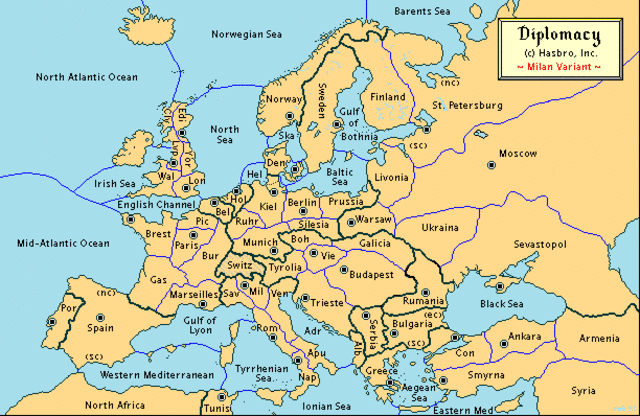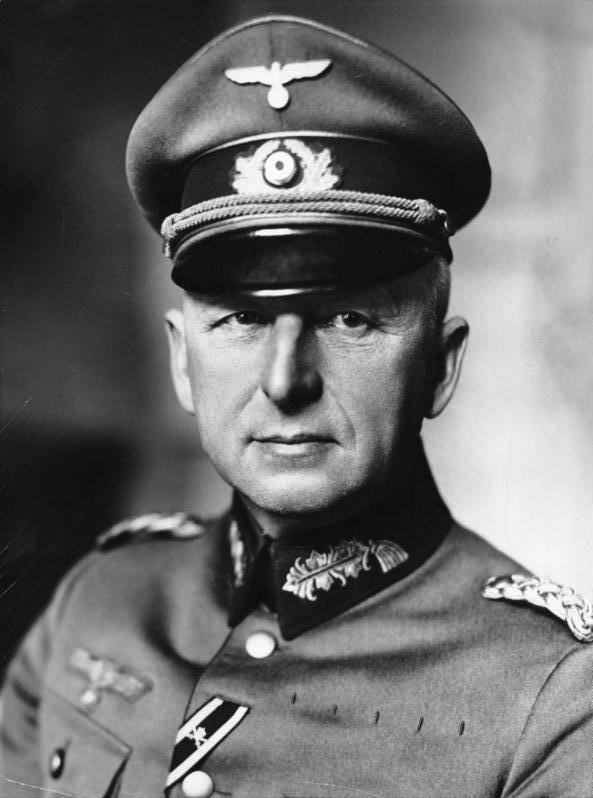Post by Desophaeus on Apr 12, 2016 6:34:50 GMT
Seeing 3 alternatives for TWs and their features... I believe that the game of Diplomacy has its unique niche that could contribute to the RP board.
This is rather radically unlike what TWs are... Diplomacy is quite different because:
*There is no technology research involved
*Each unit, whether it be an army or a fleet, is equally strong or weak as any other.
*Combat is decided by the rules of sorting orders out rather than dice rolling. No luck is involved throughout the whole game.
*Stacking isn't allowed. Each space can only hold one unit at a time. This is not Risk.
*All pieces makes their move at the same time
*Orders needs to be written and submitted to the GM privately and preferably before a pre-appointed time, rather than posted in the forum
*the GM will process the orders by the rules of how moves work, conflict, cancel, etc... then post the final result of the orders for all to see (unless there's a Fog of War variant, then the players gets their own results back from the GM in private)
*Each nation makes its own independent decisions on relations, wars, treaties. No factions. No artificial salt forced upon a player.
*treaties whether spoken or written has no legal binding except for the player's code of honor (or a lack thereof)
*The GM's main responsibility is to process the set of orders and to communicate with the players for deadlines and vacations
*If a player needs to be offline for a serious while, he may choose his own replacement and inform the GM or request a vacation hold to be placed on the game for a short period
*Communiques between players are highly encouraged, it's a vital part to be successful in Diplomacy. They are usually made in emails (private messages for this forum, really).
I quote from
diplom.org/Welcome.html
This is rather radically unlike what TWs are... Diplomacy is quite different because:
*There is no technology research involved
*Each unit, whether it be an army or a fleet, is equally strong or weak as any other.
*Combat is decided by the rules of sorting orders out rather than dice rolling. No luck is involved throughout the whole game.
*Stacking isn't allowed. Each space can only hold one unit at a time. This is not Risk.
*All pieces makes their move at the same time
*Orders needs to be written and submitted to the GM privately and preferably before a pre-appointed time, rather than posted in the forum
*the GM will process the orders by the rules of how moves work, conflict, cancel, etc... then post the final result of the orders for all to see (unless there's a Fog of War variant, then the players gets their own results back from the GM in private)
*Each nation makes its own independent decisions on relations, wars, treaties. No factions. No artificial salt forced upon a player.
*treaties whether spoken or written has no legal binding except for the player's code of honor (or a lack thereof)
*The GM's main responsibility is to process the set of orders and to communicate with the players for deadlines and vacations
*If a player needs to be offline for a serious while, he may choose his own replacement and inform the GM or request a vacation hold to be placed on the game for a short period
*Communiques between players are highly encouraged, it's a vital part to be successful in Diplomacy. They are usually made in emails (private messages for this forum, really).
I quote from
diplom.org/Welcome.html
The beauty of the game of Diplomacy lies not in the tactics of the movement of the pieces on the board, but in the fact that these movements are simultaneous, meaning that the orders of all players are executed at the same time on each turn. Whose moves succeed and whose fail are easily determined by the simple rules of the game which permit and govern the combination of multiple units to strengthen (or weaken) any single move or other action.
Crowning all this, however, is the fact that any player of the game is lost without allies. To play the game without receiving assistance from the pieces owned by other players and without lending assistance to other players' pieces is to set yourself up for failure. Indeed, the most important part of the game is the wide-open, free-for-all, promise-the-moon negotiations which occur before each move; negotiations which establish alliances, elaborate war plans, and backstabs.
Backstabs? Yes, because regardless of what a player promises to do before the turn, what he actually does is wholly determined by the secret orders he submits for his pieces.
Combining with other players to defeat a common foe, secretly arranging peace with the enemy, and suddenly turning on your ally, who has trusted you and worked with you since the first move, is all part of the game. All's fair in love and war, so the saying goes, and in Diplomacy, one is often simply a mask for the other.
The final outcome of a game of Diplomacy is always the responsibility -- for better or worse -- of each player. Diplomacy offers a totally chanceless (there are no dice to roll, no tables to consult, no random events to deal with) competition of wits and wiles.
Crowning all this, however, is the fact that any player of the game is lost without allies. To play the game without receiving assistance from the pieces owned by other players and without lending assistance to other players' pieces is to set yourself up for failure. Indeed, the most important part of the game is the wide-open, free-for-all, promise-the-moon negotiations which occur before each move; negotiations which establish alliances, elaborate war plans, and backstabs.
Backstabs? Yes, because regardless of what a player promises to do before the turn, what he actually does is wholly determined by the secret orders he submits for his pieces.
Combining with other players to defeat a common foe, secretly arranging peace with the enemy, and suddenly turning on your ally, who has trusted you and worked with you since the first move, is all part of the game. All's fair in love and war, so the saying goes, and in Diplomacy, one is often simply a mask for the other.
The final outcome of a game of Diplomacy is always the responsibility -- for better or worse -- of each player. Diplomacy offers a totally chanceless (there are no dice to roll, no tables to consult, no random events to deal with) competition of wits and wiles.










